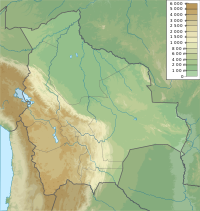Kimsa Chata (Ingavi)
| Kimsa Chata | |
|---|---|
 Chilla-Kimsa Chata mountain range as seen from Tiwanaku (looking south). Kimsa Chata lies behind the mountain Quena Chita on the left. | |
| Highest point | |
| Elevation | 4,735 m (15,535 ft)[1] |
| Coordinates | 16°39′36″S 68°40′21″W / 16.66000°S 68.67250°W |
| Geography | |
| Parent range | Andes, Chilla-Kimsa Chata mountain range |
Kimsa Chata, also spelled Kimsachata, (Aymara and Quechua kimsa three,[2][3] Pukina chata mountain,[4] "three mountains", spellings Quimsachata, Quimsa Chata) is a 4,735-metre-high (15,535 ft) mountain in the Andes in Bolivia. It is located in the Chilla-Kimsa Chata mountain range south-east of Wiñaymarka Lake, the southern part of Lake Titicaca. It lies in the La Paz Department, Ingavi Province, Tiwanaku Municipality, about 15 km south of the archaeological site of Tiwanaku and the village of the same name. Kimsa Chata is situated between the mountains Nasa Puqi in the north and Chuqi Ch'iwani in the south.[1][5][6]
Kimsa Chata is a ceremonial and sacred mountain of the Aymara people.[7] This is also where the Aymara Willkakuti feast takes place.[8]
See also
References
- ^ a b Bolivian IGM map 1:250,000 La Paz SE-19-03
- ^ Radio San Gabriel, "Instituto Radiofonico de Promoción Aymara" (IRPA) 1993, Republicado por Instituto de las Lenguas y Literaturas Andinas-Amazónicas (ILLLA-A) 2011, Transcripción del Vocabulario de la Lengua Aymara, P. Ludovico Bertonio 1612 (Spanish-Aymara-Aymara-Spanish dictionary)
- ^ Teofilo Laime Ajacopa (2007). Diccionario Bilingüe: Iskay simipi yuyayk’anch: Quechua – Castellano / Castellano – Quechua (PDF). La Paz, Bolivia: futatraw.ourproject.org.
- ^ Teofilo Laime Ajacopa, Lengua Pukina en Jesús de Machaca
- ^ Bolivian IGM map 1:50,000 Tiahuanacu 5844-II
- ^ "Tiawanacu". INE, Bolivia. Archived from the original on October 23, 2014. Retrieved October 23, 2014.
- ^ [1] Preparan ofrenda para la montaña sagrada Kimsa Chata de Tiwanaku (Spanish)
- ^ "Tiwanaku. A la ceremonia del retorno del sol le anteceden ritos que se realizan en las montañas". Viceministerio de Descolonización (Bolivia). Retrieved March 24, 2014.


